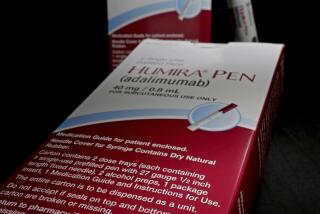Drug Companies Suing for Right to Market Generic AZT
- Share via
WASHINGTON — The outcome of a lawsuit unfolding in a North Carolina courtroom could determine whether AZT--the most widely prescribed anti-AIDS drug--can be marketed soon in a much cheaper generic version.
Two drug companies are engaged in a battle with North Carolina-based Burroughs Wellcome Co., the drug’s manufacturer, for the right to make and sell the drug at a lower price now--instead of waiting for the company’s patent to expire in 2005.
AZT is the first-line antiviral treatment for individuals with fully developed AIDS and for those who are infected and whose immune systems have begun to erode, even though they have not developed symptoms. It costs about $2,200 annually.
Ironically, the key to the debate is the role of the federal government, specifically the National Institutes of Health, in the development of the drug.
While cooperation between the NIH and Burroughs Wellcome was widely hailed in the 1980s, the company is now attempting to convince a court that it was the sole developer of the drug and that it should retain the exclusive rights to make and distribute AZT.
BACKGROUND: The two rival companies--Barr Laboratories of Pomona, N.Y., and Novopharm Ltd. of Scarborough, Canada--claim that the involvement of federal scientists in early research on AZT makes them “co-inventors” of the drug, thereby invalidating Burroughs Wellcome’s claim to its exclusive patent.
Barr argues that Burroughs Wellcome’s researchers would never have known about AZT’s effectiveness without a unique test on the cells of humans to show that the drug halts the spread of the human immunodeficiency virus, which causes AIDS.
The test, which was done at personal risk because it used live samples of the virus, was developed and performed in February, 1985, by Dr. Samuel Broder and Dr. Hiroaki Mitsuya of the National Cancer Institute, part of the NIH.
“The American taxpayers . . . funded much of the research,” Barr’s attorneys said in a statement. “Because of the work by dedicated scientists at the National Institutes of Health with AZT and the live AIDS virus, we strongly believe those scientists should be credited as co-inventors, making NIH a co-holder of the AZT patent.”
Barr contends that it could cut the cost of AZT in half.
Burroughs Wellcome, on the other hand, downplays the contribution of the NIH researchers, insisting that the government scientists only confirmed what company scientists already knew.
The key issue is who “discovered the use of the drug as a treatment for HIV infection,” said Burroughs Wellcome spokeswoman Kathy Bartlett. “It’s the discovery--not the development.”
The company, in a statement, argues that “the invention made by . . . Burroughs Wellcome scientists was complete before anyone at the National Institutes of Health performed any work on the compound AZT. In fact, the NIH scientists did not know the identity of the compound we sent them to test.”
Some observers say that if Barr and Novopharm win, drug companies might be less inclined to do innovative research and development, or collaborate with government scientific agencies.
The NIH supports the right of Barr and Novopharm to make a generic AZT. In fact, the NIH has already granted Barr a license--an action Burroughs Wellcome is attempting to block through the current trial, which is slated to last another month.
OUTLOOK: To many observers, the legalities being played out in the New Bern, N.C., courtroom have been disconcerting to say the least.
In the mid-1980s, the collaboration between Burroughs Wellcome, academia and the federal government was warmly and publicly embraced by all the parties involved.
Researchers from all three realms of science appeared numerous times together after studies began to show, with some dramatic results, that the drug was having an impact.
At the time, no one hesitated to laud the partnership.
So now, as Burroughs Wellcome seeks to minimize the NIH contribution, AIDS researchers are privately grumbling about Burroughs Wellcome’s “collective memory loss,” although none will speak on the record.
More to Read
Sign up for Essential California
The most important California stories and recommendations in your inbox every morning.
You may occasionally receive promotional content from the Los Angeles Times.










